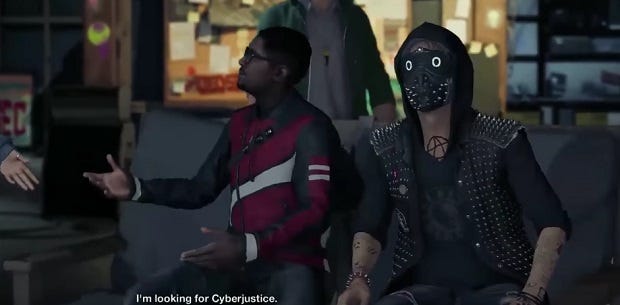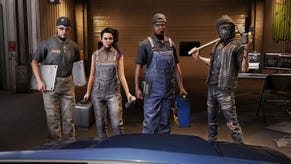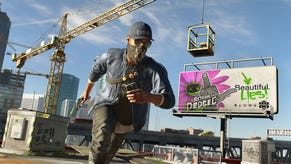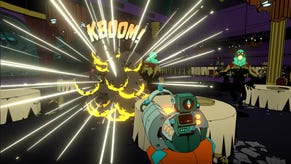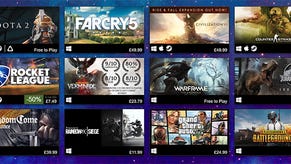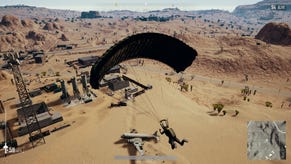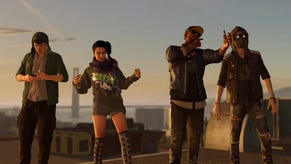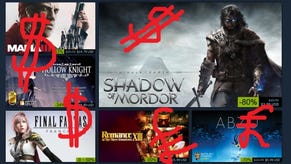Watch Dogs 2 is an antidote to the grimness of GTA
Hacks and hexes
I've been playing Watch Dogs 2 [official site] for most of a day and a night, and I haven't killed anyone yet. The game's recreation of San Francisco and outlaw protagonist make Grand Theft Auto the obvious point of comparison, and while it's certainly possible to take the ultraviolence and careless crime route in your travels around the city, stealth infiltration and surveillance are much more suited to the game's toolset and mood.
Whatever else it might be, and I'll cover as much as I can below, Watch Dogs 2 is a more thoughtful, brighter alternative to Rockstar's take on the open world urban action adventure.
It doesn't start well. Before you can drive across the Golden Gate Bridge and dig into the sights and sounds of Oakland and San Francisco, you'll need to play through an opening mission that introduces new protagonist Marcus Holloway. He's taking part in a trial to join the underground hacking group DedSec, but the objective they've set him has personal meaning as well.
Watch Dogs' world has a little of Minority Report baked into its hack-happy counter-corporate tale. As well as denying credit card, mortgage and health insurance approval based on data checks and future projections of wealth and social mobility, governments and corporations predict criminality by analysing behaviour and identity. Marcus, a black man in his mid-twenties, has an unearned criminal record and DedSec's test will see him breaking into a server farm to eliminate all traces of that record.
It's a pre-credits tutorial-type mission that teaches you the basics of hacking in-world objects and using stealth to infiltrate secure locations. Given how little time it takes – half an hour TOPS – it's not worth dwelling on, but I feel it's important to point out that server farms are among the most boring locations in the world. Essentially an office building full of cubes, it's the equivalent of an FPS game using its sewer or warehouse level right at the start, a handshake with a joy(less) buzzer.
As soon as you get out into the wider world, with a first mission objective to buy some trousers after a drunken hook-up that leaves you in pink shorts decorated with poo emojis and unicorns, the corridors and gray blocks are quickly forgotten. San Francisco and the surrounding Bay area on show are spectacular. I'm running the game on a GTX 980 and can't take advantage of all of the fancy bells and whistles that the PC version comes packed with (including ultra-fancy textures and a gorgeous dynamic fog effect), but on Medium settings the city is still a thing of beauty, even if buildings look a little too blocky and rough.
Judging by reports from other people playing, my machine seems to be punching a little bit below its weight when it comes to Watch Dogs 2, which is only fair considering it inexplicably dodged every problem Dishonored 2 threw at it, and ran that game perfectly. My performance summary goes like this: Watch Dogs 2 runs well but it's the first game in a good while that has me looking to upgrade because I really want to see it at its best.
Let's go back to those poo emoji boxer shorts for a second though. They're the tip of a rather zany iceberg, and the crew of DedSec are at the centre of that iceberg. Don't panic if you're allergic to emojis though. Not yet.
The little gang of hackers you join have their HQ underneath a boardgame store. There are only four of them, before Marcus joins, and, to paraphrase one of their audio recordings, they fill the spectrum from introverted nerd to extrovert anarchist. They're ridiculous and goofy rather than edgy – as silly as they can be, the writing always seems to be aware that they're right on the brink of being hipsters and poseurs, provocateurs rather than activist warriors. But, so far, they are idealistic and with enough Robin Hood leanings to be a force for good, taking down the likes of a blatant Martin Shkreli analogue not by publicly humiliating him but by fooling him into donating millions to leukemia research.
There's an odd mix of earnest drawn-from-the-headlines social awareness and geeky pop culture references, and a sprinkling of satire on top of the whole thing. It's working for me at the moment. I like these doofuses, especially Marcus, and I'm kind of glad the early stages of the plot aren't particularly high-stakes, despite the over-arching objective being a take-down of the game's very own Evil Corp. To begin with, you're essentially pulling off high profile pranks to get new followers for your app. You're running a social media account, basically, and 3d printing drones so you can use them to hack into servers and steal money to buy some hipster clothes.
It all sounds more than a little bit unbearable written down like that but some decent voice acting and a generally upbeat mood makes it all a fairly pleasant antidote to the grim and the gritty that too often takes up my time in these kind of games. You'll either buy into it or you won't – for me, it was a very conscious decision to either run with it or kick against it. I ran with it and haven't tripped over anything yet. GTA, a series I still enjoy, increasingly reminds me of those teenagers at the Smashing Pumpkins gig in The Simpsons; in comparison, Watch Dogs 2 is like an excitable puppy. It might do a wee up the wall from time to time and make evil smells, but it's adorable enough to get away with it.
That positive attitude and sense of playfulness only goes so far though. So far, where Watch Dogs 2 has fallen a little short is in addressing my main issue with this kind of open city game: the missions feel a little too repetitive. Getting to places and doing the silly things in between is a lot more fun than actually dealing with my objectives when I arrive. Heck, there's an Uber-like app you can download to do some Crazy Taxi style sidejobs, and I currently prefer that to following the main missions.
It's not that they're badly designed in particular, it's more that they become repetitive. Hacking is at the heart of them and I've managed to complete a few without actually putting Marcus in the line of fire at all. Using a remote control ground vehicle and drone (the ubiquity of drones will date so much media from the last couple of years), you can use your remote hacking skillz to 'teleport' through buildings, slipping from camera to camera, and unlocking doors and servers as you go. You're not actually teleporting, of course, just sending your hack from one hotspot to the next and creating chaos or clean routes as you go.
And that's enjoyable! It really is. But unlike the best infiltration games, Watch Dogs 2 fails to create tension. That's partly because every mission I've played so far manages to feel like an interlude rather than a serious undertaking. I've never been in deep enough to care if I get caught or even killed. Just as there's a lack of long-term consequences for your actions in the city, failure on a mission is more likely to be a frustration than a meaningful loss.
For all that it has pleasing differences to GTA, Watch Dogs 2 has a great deal in common with the series, and one of the most notable elements they share is the lack of impact all of your actions make. I might not be killing anyone in my current playthrough, but if I were to plough through Union Square in a bus and crush the crowds, I could shake off the police that responded and return later the same day to find the mess cleaned up, and everything forgotten and/or forgiven. For all its beauty and the thousands of little details that bring it to life, the city is made of set dressing and extras.
But I'm having more fun causing chaos with all of my little hacking skills than I ever do with the automatic weapons of similar games. Rewiring traffic lights to create a chain reaction of minor collisions, or causing distractions and forced misdirection is great fun. Because it happens instantly and tends to cause accidents, I think of the hacking as a superpower; it's essentially Scarlet Witch's hex ability and it's a splendid way to mess with NPCs. It can actually be useful though, and is particularly helpful when you decide to engage with the multiplayer aspects of the game.
That's when the big action sequences tend to happen – car chases and shoot-outs and police car pile-ups – and the integration into the singleplayer game is fantastic. Some multiplayer segments are randomised cooperative missions, but occasionally when someone is causing too much trouble in their version of San Francisco, your sessions will fold together so that you can choose to help out the cops and hunt them down as a bounty. And this can happen the other way around as well – other players effectively invading your game to take you out when you're causing too much trouble.
The earlier console launch saw this seamless multiplayer stuff running into all kinds of problems but I've seen none so far on PC. It works perfectly and makes the singleplayer city feel so much more alive that I can't imagine doing without it, though you can switch it off if you'd rather be left alone.
I'm going to finish all of the main missions and spend some more time exploring the city and its other attractions before writing a full review, but for now I'm having a good time with Watch Dogs 2. Its hacking powers, mood and potential for non-lethal play make it a fine alternative to the likes of Saints Row and GTA, but even though I love the city and its surroundings, I'm not convinced that the appeal of sneaking, driving, pestering NPCs and shopping for clothes will stay fresh for another ten or twenty hours.
You can pet dogs in the parks though.
